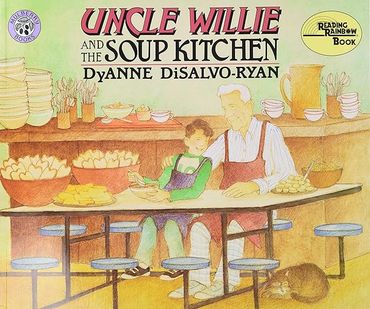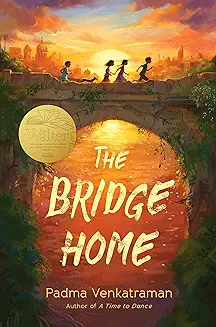Grades Preschool through 5

Uncle Willie and the Soup Kitchen (K-3)
This lesson addresses the social issues of homelessness and hunger through the eyes of a young boy who serves as a role model when he volunteers at a local soup kitchen. Students will categorize goods and services and create a handmade telescope in which to view the world around them.
The Bridge Home
Decision-Making Lesson: (4-6) Viji may just be 11-years old, but she finds herself responsible for herself and her older sister. She must make good decisions if she and Rukku are to survive while living on the streets of Chennai, India. Can a decision-making model help her make good choices? This lesson introduces students to a problem-solving tool that encourages critical thinking and analytical skills while applying economic concepts like human capital, earning income, and more.
Opportunity Cost Lesson: (4-6) This lesson centers around choices faced by characters in the book, The Bridge Home, by Padma Venkatraman. Through the activities, students learn about the main characters, Viji and her sister Rukku, and the problems they encounter both in and out of their home in Chennai India. Students will put themselves in the sisters’ shoes to evaluate given choices and identify the opportunity cost. Students will also rank various choices while participating in an interactive problem-solving group activity.
My Papi Has a Motorcycle (3-5)
This lesson highlights Spanish-language and Hispanic culture, as well as immigration, through a story about a little girl who celebrates the businesses and types of jobs in her community and how they have changed.
The Night Worker (PreK-1)
This lesson, based on a children's story, will introduce students to productive resources related to certain jobs and how human capital helps workers perform their jobs. It also focuses on labor-based/trade jobs.
Let Them Play (K-4)
In this lesson, students will be introduced to the concepts of resources, scarcity, human capital and boycott. After reading a reality-based story about an all-black Little League team that faced racial prejudice, students will determine resources used in the production of baseball-related goods and complete comprehension and analysis-driven activities tied to key vocabulary covered within the lesson.
Grades 6-8

The Bridge Home: Employment (6-8)
This lesson will introduce middle school students to economic concepts related to employment as they interactively explore human capital needed for certain jobs and apply workforce-ready skills such as teamwork, leadership, critical thinking, and more.
Darnell Rock Reporting (5-8)
Darnell Rock is not the kind of student to volunteer for the school newspaper. In fact, he is one of the students who usually gets into trouble. This lesson introduces students to Darnell's story as he learns about homelessness and how to use his voice to bring about positive changes in his community. The concepts included can be utilized in ELA, social studies, economics, and career pathways.
Mimi's Village (4-7)
This lesson introduces students to health care practices and services, as well as healthcare professions, including differences across geographic regions and income levels. It also exposes students to African culture and how concepts such as median income and standard of living intersect with economic conditions.
Crenshaw (4-6)
This lesson introduces students to the challenges faced by those who live in poverty due to homelessness, unemployment and/or low-income jobs.
Isabel's Car Wash (4-6)
This lesson introduces the roles of entrepreneur and investor in the context of starting a business through the book, Isabel's Car Wash.
One Plastic Bag (3-6)
In this lesson, students will learn about responsible consumption and how the choices we make when disposing of trash can impact the environment.
Grades 9-12
Money Hungry
Earning, Spending, and Saving Lesson (9-12) In this lesson students will consider ways to earn money, to understand how it is spent, and to identify reasons for saving it for the future.
Entrepreneurship Lesson (9-12) In this lesson, students will participate in an interactive activity to explore the roles of entrepreneur and consumer, while employing mathematical skills and collaborating to create and analyze aspects of a business
Twenty-two Cents: Muhammad Yunus and the Village Bank (9-12)
In this lesson, students will explore an array of economic concepts related to entrepreneurship, banking, poverty and economic decision-making through the story of Muhammad Yunus, the founder of Grameen Bank.
